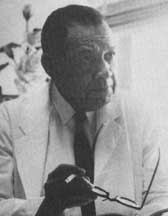Tuskegee Syphilis Study
Study of untreated syphilis in African American men
The Tuskegee Syphilis Study was a clinical study conducted between 1932 and 1972 by the United States Public Health Service (USPHS) and the Centers for Disease Control (CDC). The study aimed to observe the natural progression of untreated syphilis in rural African American men in Macon County, Alabama, under the guise of receiving free health care from the government.
Background[edit | edit source]
The study began in 1932 during the Great Depression, a time when there were few medical treatments available for syphilis. The USPHS, working with the Tuskegee Institute, enrolled 600 impoverished African American sharecroppers from Macon County. Of these men, 399 had latent syphilis, and 201 did not have the disease. The men were told they were being treated for "bad blood," a local term used to describe several ailments, including syphilis, anemia, and fatigue.
Study Design[edit | edit source]
The study was initially projected to last six months but continued for 40 years. The men were given free medical exams, meals, and burial insurance, but they were not informed of their diagnosis nor were they treated for syphilis. Instead, the study aimed to observe the natural progression of the disease.
Ethical Issues[edit | edit source]
The study has been widely criticized for its ethical shortcomings. The men were not informed of the study's true purpose and were misled into believing they were receiving treatment. Even after penicillin became the standard treatment for syphilis in 1947, the men were not offered the antibiotic.
Role of Key Figures[edit | edit source]
Eunice Rivers, an African American nurse, played a significant role in the study. She was responsible for maintaining contact with the study participants and ensuring their continued participation. Her involvement has been a subject of controversy, as she was seen as a trusted figure by the men.
Eugene Dibble, the head of the Tuskegee Institute's hospital, was also involved in the study. His role was crucial in facilitating the study's operations at the Tuskegee Institute.
Termination and Aftermath[edit | edit source]
The study was brought to public attention in 1972 by a whistleblower, leading to its termination. The ensuing public outcry resulted in a class-action lawsuit and a $10 million settlement for the study's participants and their families. In 1997, President Bill Clinton formally apologized on behalf of the United States government.
Impact on Research Ethics[edit | edit source]
The Tuskegee Syphilis Study is often cited as a major reason for the establishment of ethical standards in medical research. It led to the creation of the National Commission for the Protection of Human Subjects of Biomedical and Behavioral Research and the Belmont Report, which outlines ethical principles and guidelines for research involving human subjects.
Related pages[edit | edit source]
Search WikiMD
Ad.Tired of being Overweight? Try W8MD's physician weight loss program.
Semaglutide (Ozempic / Wegovy and Tirzepatide (Mounjaro / Zepbound) available.
Advertise on WikiMD
|
WikiMD's Wellness Encyclopedia |
| Let Food Be Thy Medicine Medicine Thy Food - Hippocrates |
Translate this page: - East Asian
中文,
日本,
한국어,
South Asian
हिन्दी,
தமிழ்,
తెలుగు,
Urdu,
ಕನ್ನಡ,
Southeast Asian
Indonesian,
Vietnamese,
Thai,
မြန်မာဘာသာ,
বাংলা
European
español,
Deutsch,
français,
Greek,
português do Brasil,
polski,
română,
русский,
Nederlands,
norsk,
svenska,
suomi,
Italian
Middle Eastern & African
عربى,
Turkish,
Persian,
Hebrew,
Afrikaans,
isiZulu,
Kiswahili,
Other
Bulgarian,
Hungarian,
Czech,
Swedish,
മലയാളം,
मराठी,
ਪੰਜਾਬੀ,
ગુજરાતી,
Portuguese,
Ukrainian
Medical Disclaimer: WikiMD is not a substitute for professional medical advice. The information on WikiMD is provided as an information resource only, may be incorrect, outdated or misleading, and is not to be used or relied on for any diagnostic or treatment purposes. Please consult your health care provider before making any healthcare decisions or for guidance about a specific medical condition. WikiMD expressly disclaims responsibility, and shall have no liability, for any damages, loss, injury, or liability whatsoever suffered as a result of your reliance on the information contained in this site. By visiting this site you agree to the foregoing terms and conditions, which may from time to time be changed or supplemented by WikiMD. If you do not agree to the foregoing terms and conditions, you should not enter or use this site. See full disclaimer.
Credits:Most images are courtesy of Wikimedia commons, and templates, categories Wikipedia, licensed under CC BY SA or similar.
Contributors: Prab R. Tumpati, MD




